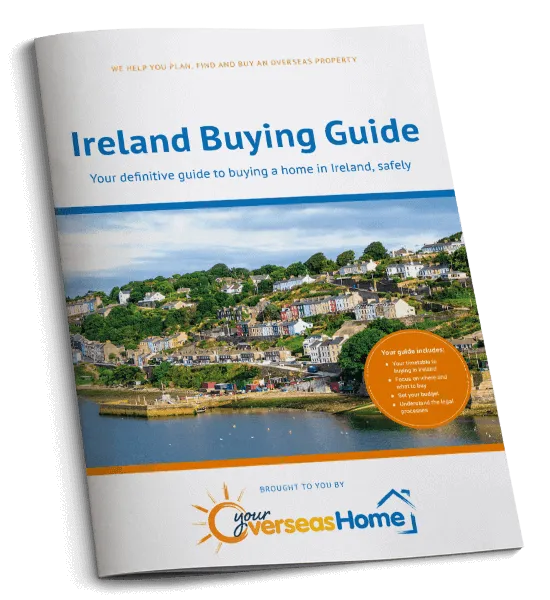When you’re thinking about buying property there is a lot to think about. When moving overseas this is an even bigger deal. There are a number of different specifics that you should consider depending on where you are moving to. For those thinking about moving to Ireland, we have put together a list of the main things you will need consider to help with a safe and secure property purchase.
Consider where you want to live
Many people will have a good idea of where in Ireland they want to live. Mainly thanks to previous visits there or because they have families in the area. However, some people may need to sit down and think about what it is they are looking for here. Ireland has an incredibly diverse landscape, with Dublin incredibly popular for those looking for a city life – and the added benefit of the countryside being incredibly close by. Galway is popular for its culture, while County Kerry is known for its beautiful landscapes and outdoor pursuits.
Finding the right estate agent is one of the most important aspects of your journey to purchasing your dream home in Ireland.
Finding the right estate agent
This is one of the most important aspects of your journey to purchasing your dream home in Ireland. You should find an estate agent who is registered with the Property Services Regulatory Authority in Ireland. They should be able to meet all your needs – such as listening to your brief and only showing you properties that meet your needs, and give you additional information on your new local neighbourhood, such as the nearby amenities and facilities. Your estate agent should be proactive and go out of their way to help you find your dream home. They should be on hand to answer any questions you have about the property.
Choosing your solicitor
Choosing the right independent solicitor is so important when purchasing property in Ireland. It’s their job ensure that you are protected during your property buying journey. This is a legal transaction and you will be spending a significant amount of money. Two enormous reasons for ensuring that every i is dotted and every t crossed. Your solicitor will guide you through the entire process, protecting your needs and wants. They will ensure you are in no way affected by any issue on the vendors side – such as unpaid mortgage costs or similar.
Getting a good deal on your Irish home is often a question of good planning and research. Read our guide: How to Negotiate Abroad to give yourself a head start.
There are currently no legal restrictions for UK residents purchasing property in Ireland. While there has been a question over whether this will be affected by the UK leaving the EU, recent developments suggest that the relationship between the citizens in the two countries will remain the same thanks to legislation that pre-exists to the European Union.
Getting a building survey
Once you have chosen your new area and found a property, you will begin to move through the purchase process. At this point we recommend getting a building survey. This will ensure there are no hidden defects in the property that could cost you money. You should choose an independent surveyor who is registered by the Society of Chartered Surveyors Ireland (SCSI). These defects could include things such as rising damp, pyrite, broken sewerage pipes or similar and could cost a significant amount of money to repair – especially if they are left unnoticed for a while.

You’ll have the keys to your new Irish home before you know it with a bit of planning.
Property buying costs
In addition to the actual cost of the property, you will need to consider the additional costs. These will usually add up to a minimum of 5% of the purchase price. They typically include stamp duty, legal and deed registration fees, a valuation fee, VAT (on certain properties), the cost of utility connections, estate agent’s fees and various fees and costs associated with the mortgage. It’s important to ensure you know the full price of all these additional costs before you sign a contract.
Transferring your funds to Ireland
Unless you have a lump sum in euros in Ireland, it is likely that you will need to transfer your money over the currency market into sterling. We recommend using a currency exchange specialist, such as Smart Currency Exchange. They offer a number of tools and resources that you can use to make the most of your transfers and reduce the risks associated with sending money overseas, both to purchase your property and to fund your life here.
Get a free, no-obligation quote from Smart Currency Exchange today.
Cost of living
While the UK is renowned for its high cost of living, Ireland is generally more expensive. According to Numbeo, consumer prices are around 12% higher in Ireland than in the UK, and rent prices are almost 40% higher. Even grocery prices are more than 15% higher in Ireland than in the UK.
As you may expect, the most expensive cities in these countries are their capitals. While Dublin is certainly rising in the ranks of expensive towns, the costs in most areas to do pale compared to London pricing – particularly in terms of rent; however, grocery prices are higher in Dublin. As you would expect, the further you move out of Dublin towards the countryside, the less it costs to live.
Schools
If you are moving to Ireland with young children, give careful consideration to where to send them to school. We recommend involving your children in the decision to ensure they feel more like part of this journey. This will help them deal with any anxieties they may have about it. You will usually be able to find out a lot of information about the school on their website, which could also be helpful for your children to assimilate themselves in the new environment. In Ireland education is compulsory from ages six to sixteen. There are several different options available at the different school ages, depending on your child’s strengths and needs.
It is incredibly important to think about how you will take care of your health once you live there.
Healthcare
For anyone moving to Ireland, it is incredibly important to think about how you will take care of your health. We recommend assessing your options before you go. Ireland has a very high standard of healthcare, with modern facilities and well-qualified doctors. Like the UK, there is a public system, although there will be similar issues that you may be used to with the NHS – such as long waiting times and delays. Unlike in the UK, you will usually have to pay for some parts of your treatment. Some expats often decide to take out a private medical insurance policy. This ensures they are covered for everything and can also take advantage of a faster service.
We recommend looking into the local medical facilities before you make a definite decision as to where you want to live – particularly if you have specific needs in this area.
Accessibility
One of the benefits of moving to Ireland from the UK is its close proximity. This makes it easier to visit the country during the buying process. It also means you can make visits home with ease – and have your friends and family visit you once settled in.
There are two budget airlines offering flights between the UK and Ireland – Aer Lingus and Ryanair – but you can also take a ferry from various places around the two countries, mainly from Liverpool in England and Holyhead in Wales. The journey usually takes around two hours, but you can choose faster or slower routes depending on your needs – the journey can be quite scenic if you decide to take a longer journey and enjoy your trip. Additionally, you can also easily and relatively cheaply access the rest of Europe through ferries or air travel, allowing you to spend some time exploring the continent during the weekend or when you have some free time.







